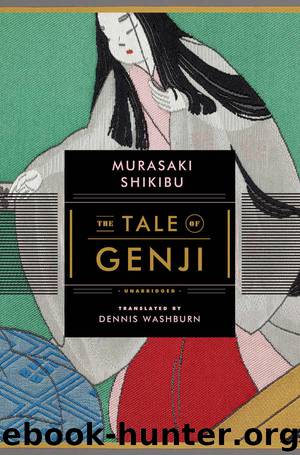The Tale of Genji (unabridged) by Shikibu Murasaki

Author:Shikibu Murasaki [Murasaki, Shikibu]
Language: eng
Format: epub
Publisher: W. W. Norton & Company
Published: 2015-07-26T22:00:00+00:00
1 This character does not appear elsewhere in the work.
2 The space was called the Kaedono.
3 The word for “early spring greens,” wakana, gives this chapter its title. Wakana refers to both greens, such as turnip leaf or bracken (fiddlehead ferns), and herbs, such as water pepper or dropwort. There were twelve traditional wakana, and they were used for both food and medicinal purposes. Tamakazura brings them to Genji because they were thought to extend life and bring back youthful vigor. The symbolic meaning for Genji, who is forty and marrying a very young princess, is obvious.
4 It was customary to pull up pine seedlings by their roots as a symbol of long life and felicity. This custom arose in part because the word for “rat” (ne) is a homophone for the word “root.” Here, the seedlings symbolize Tamakazura’s children.
5 Kokinshū 41 (Ôshikōchi no Mitsune): “The darkness of a spring night tries in vain to obscure things ... for while we may not see the color of the plum blossoms, can their fragrance be hidden?”
6 Hakushi monjū 911, “Dawn from the tower of Yū Hsin.”
7 This sentence may be interpreted in a different way, as: “Your attendants didn’t open the shutter for me because they’re all so frightened of you. They are not to blame.”
8 Gosenshū 479 (Fujiwara no Kagemoto): “This light snow that blows wildly in the sky before melting away is like the heart of one lost in love.”
9 Yakamochi shū 284 (Ōtomo no Yakamochi): “On branches of plum, indistinguishable from the whiteness of the blossoms, patches of snow linger as if waiting for those flowers like welcoming companions.”
10 Kokinshū 32 (Anonymous): “Having broken off a branch of plum, my sleeves are scented ... is it because he thinks there are plum blossoms here that the warbler comes and sings to me?”
11 Murasaki has been associated with cherry blossoms throughout the work. The poetic implication here is that if Murasaki had the scent of the plum—that is, if she had the imperial rank of the Third Princess, who is associated here with plum blossoms—she would be unrivaled in his affections.
12 Kokinshū 674 (Anonymous): “How can I pretend that nothing has happened now, when rumors about me rise up like a flock of birds?”
13 This sentence simply means that Genji will make use of Chūnagon’s brother, the former governor of Izumi, to get to Oborozukiyo.
14 Genji’s poem and Oborozukiyo’s reply below both turn on a wordplay made possible by an orthographic convention that allowed fuji (“wisteria”) and fuchi (“precipice”) to be read interchangeably. They also play on korizuma ni (“to fail to learn a lesson,” or, as I have rendered it, “heedlessly/heedless”), which aurally echoes the place name Suma.
15 The poem plays on the word aki, which means “autumn,” but which could also mean “to grow tired of.”
16 Genji plays on Murasaki’s use of the word aoba (“green leaves”) by using the homophone aoba (“green-tinged wings”) to claim his devotion is unchanging and turn the complaint around on her. Kokinshū 220 (Anonymous): “The lower leaves of the bush clover in autumn have turned colors .
Download
This site does not store any files on its server. We only index and link to content provided by other sites. Please contact the content providers to delete copyright contents if any and email us, we'll remove relevant links or contents immediately.
The Hating Game by Sally Thorne(17478)
The Universe of Us by Lang Leav(14367)
Sad Girls by Lang Leav(13354)
The Lover by Duras Marguerite(7115)
Smoke & Mirrors by Michael Faudet(5509)
The Rosie Project by Graeme Simsion(5190)
The Shadow Of The Wind by Carlos Ruiz Zafón(4939)
Big Little Lies by Liane Moriarty(4881)
The Poppy War by R. F. Kuang(4433)
Memories by Lang Leav(4172)
What Alice Forgot by Liane Moriarty(3918)
An Echo of Things to Come by James Islington(3841)
From Sand and Ash by Amy Harmon(3679)
The Poetry of Pablo Neruda by Pablo Neruda(3367)
The Tattooist of Auschwitz by Heather Morris(3251)
Guild Hunters Novels 1-4 by Nalini Singh(2933)
Ficciones by Jorge Luis Borges(2860)
THE ONE YOU CANNOT HAVE by Shenoy Preeti(2827)
The Rosie Effect by Graeme Simsion(2708)
